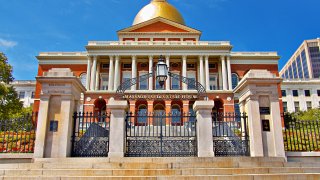
Voters will not be asked next year whether Massachusetts should revive local-option rent control after organizers working on a 2024 ballot question suspended their campaign late Friday.
After facing pushback from other housing justice and progressive groups, the effort to put the controversial idea on the ballot next year fell well short of collecting enough signatures to advance.
WATCH ANYTIME FOR FREE
Stream NBC10 Boston news for free, 24/7, wherever you are. |
Rep. Mike Connolly, a Cambridge Democrat who sought to circumvent his colleagues and place the topic directly before voters, announced Friday night the "difficult decision to suspend our campaign" and instead focus on securing changes through the Legislature.
"While this isn't the outcome we hoped for with our petition, I am more confident than ever that if given the opportunity to do so, Massachusetts voters will elect to lift the ban on rent control," Connolly wrote in a blog post. "At this point, however, it makes sense to focus on Tuesday's State House hearing on rent control bills and other landlord-tenant matters."
Get updates on what's happening in Boston to your inbox. Sign up for our News Headlines newsletter.
The decision takes one of the most high-profile proposed ballot questions out of the mix for 2024, and it leaves the Legislature — where top Democrats have shown virtually no interest in bringing back rent control — as the only avenue left for supporters hoping to make a change.
Connolly caught some by surprise when he announced last-minute plans to pursue a ballot question that would allow interested cities and towns to bring back some form of rent control, which is illegal under state law. Attorney General Andrea Campbell certified the measure as eligible to advance under the state Constitution despite challenges filed by opponents.
However, the effort stumbled over a hurdle familiar to many ballot question campaigns: collecting tens of thousands of signatures from registered voters in just more than two months.
Local
In-depth news coverage of the Greater Boston Area.
Connolly said the campaign collected about 10,175 signatures in the past six weeks, which is just a bit more than one-eighth of the 74,574 required to be submitted with local elections officials by Nov. 22.
In addition to criticism from groups that oppose rent control — which voters narrowly prohibited statewide via a 1994 ballot question — Connolly said the push to put the topic back on the ballot failed to earn the support of activists that support the policy itself.
"Unfortunately, we faced opposition from the Homes For All coalition — which includes City Life/Vida Urbana, Lynn United, SEIU state leadership, and Field First, a progressive consulting firm," Connolly wrote in his post. "Leaders of the coalition spoke out against our decision to file the petition and called on elected officials, donors, and local leaders to not support our effort. They maintained that rent control cannot win at the ballot box in 2024, and they publicly demanded that we withdraw our petition."
"Understandably, progressives were divided on how to proceed. Our suggestion to Homes for All was that we all work together to collect the 74,574 required signatures by November 22, and then, from a position of strength, we could collectively make a final decision on whether to go to the ballot later next year," he added. "In the meantime, we could use the petition as an organizing tool and as a point of leverage with the legislature. That would have afforded us more flexibility and a bigger opportunity for winning rent control right now. But it was not to be."
Supporters have argued the climate is different today than in 1994, and suggested that allowing some communities to limit rent increases could ease the pressure of a statewide housing affordability emergency.
But opponents contend the policy could stifle much-needed housing production, continuing to inflict upward pressure on prices.
"Massachusetts property owners and renters should wake up this morning knowing that their futures are better off. Rep. Connolly's potential ballot question would have done nothing but make life more expensive and miserable for property owners and renters alike," Paul Craney, a spokesperson for the right-leaning Massachusetts Fiscal Alliance, said Saturday. "Rent control does not work, it would only stop new housing development, particularly new affordable multi-family housing and put a complete halt in maintenance and upkeep."
Reviving rent control is a priority for Boston Mayor Michelle Wu, and the City Council in March voted 11-2 in support of a plan to do so. The measure needs state approval to take effect, and the Legislature's Housing Committee plans to hear testimony on the home rule petition at a hearing Tuesday.



